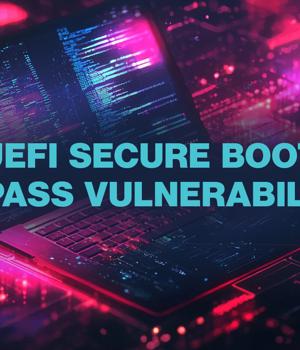Security News > 2025 > January > New UEFI Secure Boot bypass vulnerability discovered (CVE-2024-7344)

ESET researchers have identified a vulnerability (CVE-2024-7344) impacting most UEFI-based systems, which allows attackers to bypass UEFI Secure Boot. The issue was found in a UEFI application signed with Microsoft’s “Microsoft Corporation UEFI CA 2011” third-party certificate. Exploiting this vulnerability enables the execution of untrusted code during system boot, allowing attackers to deploy malicious UEFI bootkits, such as Bootkitty or BlackLotus, even on systems with UEFI Secure Boot enabled, regardless of the operating system. Impacted … More → The post New UEFI Secure Boot bypass vulnerability discovered (CVE-2024-7344) appeared first on Help Net Security.
News URL
https://www.helpnetsecurity.com/2025/01/16/uefi-secure-boot-bypass-vulnerability-cve-2024-7344/
Related news
- Attackers are targeting CrushFTP vulnerability with public PoC (CVE-2025-2825) (source)
- Ivanti VPN customers targeted via unrecognized RCE vulnerability (CVE-2025-22457) (source)
- WinRAR MotW bypass flaw fixed, update ASAP (CVE-2025-31334) (source)
- WhatsApp vulnerability could be used to infect Windows users with malware (CVE-2025-30401) (source)
- FortiSwitch vulnerability may give attackers control over vulnerable devices (CVE-2024-48887) (source)
- Windows NTLM vulnerability exploited in multiple attack campaigns (CVE-2025-24054) (source)
- CVE fallout: The splintering of the standard vulnerability tracking system has begun (source)
- Sonicwall SMA100 vulnerability exploited by attackers (CVE-2021-20035) (source)
- Critical Commvault RCE vulnerability fixed, PoC available (CVE-2025-34028) (source)
- Rack Ruby vulnerability could reveal secrets to attackers (CVE-2025-27610) (source)
Related Vulnerability
| DATE | CVE | VULNERABILITY TITLE | RISK |
|---|---|---|---|
| 2025-01-14 | CVE-2024-7344 | Improper Verification of Cryptographic Signature vulnerability in multiple products Howyar UEFI Application "Reloader" (32-bit and 64-bit) is vulnerable to execution of unsigned software in a hardcoded path. | 8.2 |